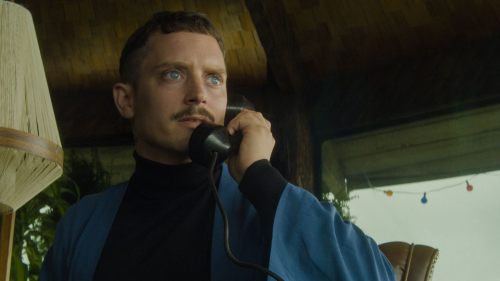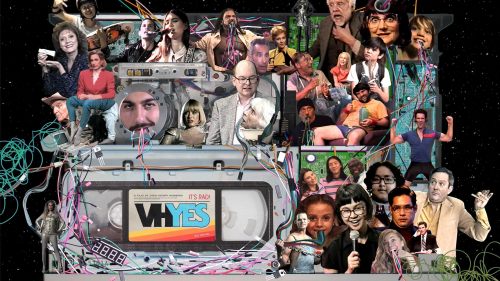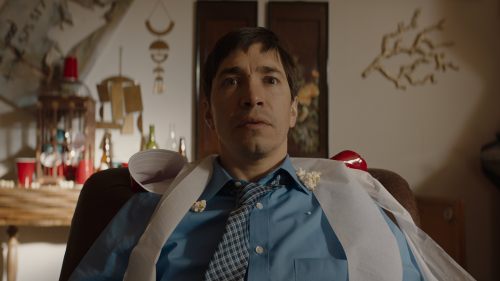Fantastic Fest Review: BODIED Is The Explosion You’ve Been Waiting For
“I don’t know what the fuck just happened, but I love what the fuck just happened.”
I could easily end my review with nothing more than that quote from the film. It’s a statement befitting of the piping hot battle raps served by skinny white English major Adam Merkin (Calum Worthy, American Vandal), whose privileged, beat poetry-inspired thesis on the use of the N-word in Hip Hop inexplicably leads him down the path of spitting insult bars in a game of riveting one-upmanship. It certainly sums up the experience of sitting down with a crowd and engaging with Bodied, a provocative, hilarious and heart-poundingly intense critique on the increasingly fragile dynamic between free speech, racism, appropriation and online outrage. I could just end things here, but that would be disingenuous to what Bodied is and all that it stands for.
It’s not just a conversation starter. It might be the conversation starter. Hell, it might even be the conversation itself, unfettered, unfiltered, and in the guise of rip-roaring entertainment as Joseph Kahn drops the mic, picks it back up and demands you investigate your biases from every conceivable angle before dropping it again and breaking the stage.
Understanding Bodied requires understanding the climate in which it was created, whether the specific conversation that led to its genesis – Kahn’s Africa-set, damned if you do, damned if you don’t “Wildest Dreams” video for Taylor Swift, which by his own account led to both necessary debate about cinema history and flat-out nonsensical accusations of supporting Apartheid – or the general tone of discourse surrounding identity politics in an increasingly react first, think later online culture. It’s not some anti-“political correctness” screed despite its characters’ refusal to adhere to the same, but a call to self-examination in the form of modern Hip Hop. That in itself is worth a look, but what separates Bodied from the rest of the pack is its willingness to get its hands dirty. These battle raps are anything-goes, getting racist, sexist, homophobic, transphobic, and ableist more often than not, but the film only ever offends with pointed intent, contextualizing its nasty rhymes within the extremes of pushing the limits of art and setting those limits in the first place, all while taking cultural whiteness to task. Think of watching the film as stepping on stage to do battle with it. It will challenge you, and it will most certainly entertain you, but you will have something to say in return when it’s done.
We open in the thick of it, with Adam and his girlfriend Maya (Rory Uphold) incredibly out of place at an underground battle. Two white upper-middle class college kids, one bursting with fervent, nerdy energy as he clutches his notebook, the other rolling her eyes at having been dragged to a den of misogynist lyrics. It’s Hip Hop approached from the standpoint of white academia, the decontextualized fascination with rap and the flat-out refusal to engage with it respectively, but as Adam and Maya go on to learn, there’s much more to it than that. Calum Worthy’s Adam is our unassuming protagonist, a timid kid living in the shadow of his father, a famous author. Words are his passion, but he straight-up sucks at the abstract beat poems he performs for crowds of less than a dozen. His ideal rap battle would probably be polite for fear of offending, and Maya would probably prefer it that way if she didn’t dismiss the art form wholesale.
After an awkward interview with his rap idol Behn Grymm (after the Fantastic Four’s Ben Grimm; the nexus between black and nerd cultures comes up later as a key part of the text), Adam gets roped into a parking lot battle at which he… doesn’t entirely suck, leading to an invite to try things out for real. From then it’s off to the races. Kahn’s kinetic camera interrogates Adam through moving close ups as he begins to navigate what is essentially a secret identity (though he can’t seem to come up with a pseudonym), having to avoid the inevitable disapproval of his vegan girlfriend as he reluctantly pulls out rhymes about eating dogs to hit his Korean American opponent. This is where we first meet Prospek (Jonathan Park), at first the mere target for Adam’s insults as both his and the audience’s comfort is tested, but Prospek is a vital piece to this puzzle. As much as the film is a satirical look at the structures of whiteness, it’s also an attempt to approach both Hip Hop and the boxes of society from a multitude of perspectives. Before long, male battle rappers Adam, Grymm, Prospek and Latino American Che Corleone (Walter Perez) join up with Devine Write (Shoniqua Shandai), a curvy black woman working within more than one of said boxes, forming a makeshift posse for a set of battles in Los Angeles. Each character breathes in ways that feel both authentic and caricatured, oscillating between hard-hitting albeit juvenile insults and down-to-Earth conversations elsewhere – about their social identities, and about the confluence of race and expectation as it relates to the game.
That authentic/caricatured dynamic is perhaps the film’s most risky high-wire performance, and finding the right balance as it unfolds feels like the thing we’re rooting for. Maya for instance, is absolutely the embodiment of the oblivious-but-well-meaning millennial, those of us who at one point or another have been well versed in the language of social justice but lacking in the real-world context and experience necessary for its application (and for any form of self-critique). That her initial objections stem from battle rap’s misogynist leanings places the film in an awkward position, owing to her being the sole female voice for a lengthy period, but this too is part of the point for those of us whose instincts are to empathize with concerns of content that may come from wearing blinders. Adam tries to flip the script on her, accusing her of a colonialist refusal to engage in a marginalized culture – he’s successful, insomuch as he manages to put off a tough conversation – but the film’s female perspective truly comes into play with both Devine, a woman forced to walk a fine line between “female rapper” and simply “rapper,” and eventually Grymm’s wife Jas (Candice Renee).
She tears into Adam for the same reasons Maya does, blinders of privilege and a sheltered perspective that seeks to adopt art and experiences that aren’t truly his, but what separates the two women laying into Adam is while Maya is concerned from a distance (not to mention unable to see her own appropriation of South and East Asian cultures as equally problematic), Jas uses the same language and the same accusations of privilege and microaggression in contexts that actually have meaning. Her adjacency to battle rap and her own experiences as a black woman mean, quite simply, she knows what the fuck she’s talking about and she isn’t about to let some dumbass outsider question her feminism or blackness for supporting a community and a complex art form that’s more than just the superficiality of its lyrics because he thinks he’s part of an inner circle.
Bodied has nothing but respect for battle rap, but it knows exactly how to investigate it too. The line between goings on of the stage and the goings on behind it need to be drawn, but where exactly is that line? All art comes from a place of expression and intent, but it has tangible impact regardless of the artist’s intention. Even an “anything goes” artistic space has limits, and while those limits can be pushed the results of doing so may not always be pleasant. Adam pushing himself to say racist things impresses even Prospek (who has genuine appreciation that most of his burns were specifically Korean, since most of what’s flung at him is stereotypes about China or Japan!), but nothing said is ever about Prospek’s inner life beyond the superficial stereotypes that become unspoken fair game in the arena, perhaps the only remaining artistic space with limits so broad. When Adam does eventually lay into the personal life of one of his opponents, a professional adversary who happens to be his friend behind the scenes, the consequences are personal too. Great art is always going to require pushing limits, but those limits are rarely without personal stakes. It all depends on who and what you’re willing to risk, including your own reputation.
Adam’s reputation takes a beating when his Prospek video goes viral sans context, and before long his friends – an Asian woman who probably has a right to be offended, and a white gay man appropriating black culture himself who probably doesn’t – have all turned on him. Even Maya gets to feel real and human before things are said and done, because while she’s the spoilsport to Adam’s fun new adventure, she also bears the brunt of his slowly changing persona. The stakes are real, the friendships are real, and the consequences are real as well, yet the art itself remains incredible, providing everything from shock laughter to simply shock as the film makes you examine your own threshold for this stuff depending on how it’s contextualized. It’s a paradox we’re forced to accept, and a paradox Adam must learn in the most difficult ways possible, losing everything to gain a little notoriety, but spitting what might be some of the most explosive movie lines this year, battle rap or not. This is cinema at its most energetic, shaking viscerally like you’ve just been curb-stomped in a video game and lighting up the screen with muzzle flashes as finger-guns and threatening couplets stand in for fists in personal disputes.
Bodied is an incendiary masterclass in balancing raucous entertainment with thoughtful, big-picture storytelling, all in the visage of something truly confrontational. It’s funny like nobody’s business, providing gut-busting offense a mile a minute, but it hinges on camaraderie even at its meanest. It takes everyone (and I mean everyone) to task, be it through a role reversal rap where Prospek and Devine do battle from each other’s perspectives to get to the root of racial and gendered jabs as an exercise in the familiar, or through the creeping realization that this audacious tale of a white dude becoming the best battle rapper around, produced by Eminem no less, begins with an external examination of an art form before slowly but surely turning the camera 180 degrees and positing examination of the self as a prerequisite; to art, to criticism, to academia, and quite simply, to navigating life itself, lest one become a total asshole in the pursuit of higher ideals. The only disappointing thing about it is the fact that feature filmmaking isn’t Joseph Kahn’s day job and we won't get another film like this for quite some time. Then again, he just made every other socially conscious artist trying to tackle the modern nexus between offense and expression look like a rank amateur, so maybe it doesn't matter.
I still don’t know what the fuck just happened. I still fucking love it.



